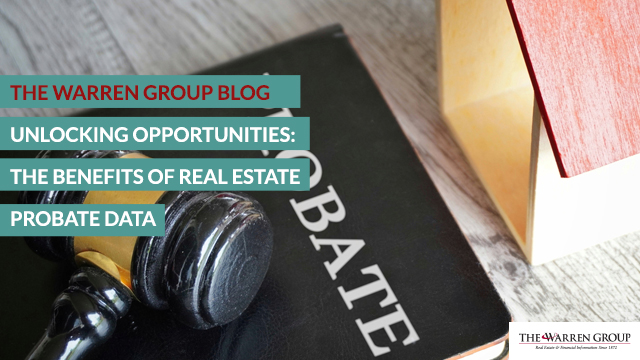When it comes to the real estate market, knowledge is power. To make informed decisions and seize lucrative opportunities, real estate professionals and investors turn to a treasure trove of information: probate and divorce data. Probate data provides crucial insights into properties that are part of an estate and understanding its benefits can help you navigate the real estate market more effectively. In this blog post, we’ll explore the advantages of real estate probate data and how it can be a game-changer in your investment strategy.
Access to Off-Market Properties – One of the most significant benefits of real estate probate data is access to off-market properties. Probate properties are often not actively listed for sale, making them hidden gems for investors. These properties can represent a diverse range of opportunities, from fixer-uppers to well-maintained homes, providing potential for substantial profits once they enter the market.
Reduced Competition – Since probate properties are not typically advertised openly, there is less competition among buyers. This means that, as an investor, you have a greater chance of securing the property at a lower price or with more favorable terms. Reduced competition can translate into better deals and higher profit margins.
Motivated Sellers – Probate properties are typically sold by the heirs or estate administrators, and they often have a strong incentive to sell the property quickly. The sellers may be looking to liquidate assets, settle debts, or distribute assets among beneficiaries. As a result, they are often more motivated to negotiate and close deals swiftly, providing opportunities for savvy investors to strike favorable terms.
Diverse Property Types – Probate properties come in various shapes and sizes. They can include single-family homes, multi-unit buildings, commercial properties, and land parcels. This diversity allows investors to diversify their real estate portfolios and cater to different investment strategies, whether it’s rental properties, fix-and-flip projects, or long-term development.
Potential for Value-Adding – Many probate properties are in need of maintenance, renovation, or upgrades. This presents a prime opportunity for investors to add value and increase the property’s market worth. By investing in these properties and making improvements, you can significantly boost your return on investment.
Negotiation Flexibility – Probate sales often come with more flexible negotiation options, as heirs or estate administrators may be willing to consider creative financing, seller financing, or other arrangements to expedite the sale. This flexibility can be particularly advantageous for investors who may face financing constraints with traditional real estate purchases.
Comprehensive Information – Probate data typically provides a comprehensive view of the property’s history, liens, and title information. This detailed information empowers investors to conduct thorough due diligence and make informed investment decisions, reducing the risks associated with real estate transactions.
Real estate probate data offers a wealth of opportunities for savvy investors. From access to off-market properties and reduced competition to motivated sellers and negotiation flexibility, the benefits are clear. The diverse range of property types and the potential for value addition only add to the allure of probate properties. By leveraging this invaluable data source, you can enhance your real estate investment strategy and unlock a world of opportunities that may have remained hidden otherwise. So, if you’re looking to take your real estate investment game to the next level, exploring probate properties should be on your agenda.


Recent Comments